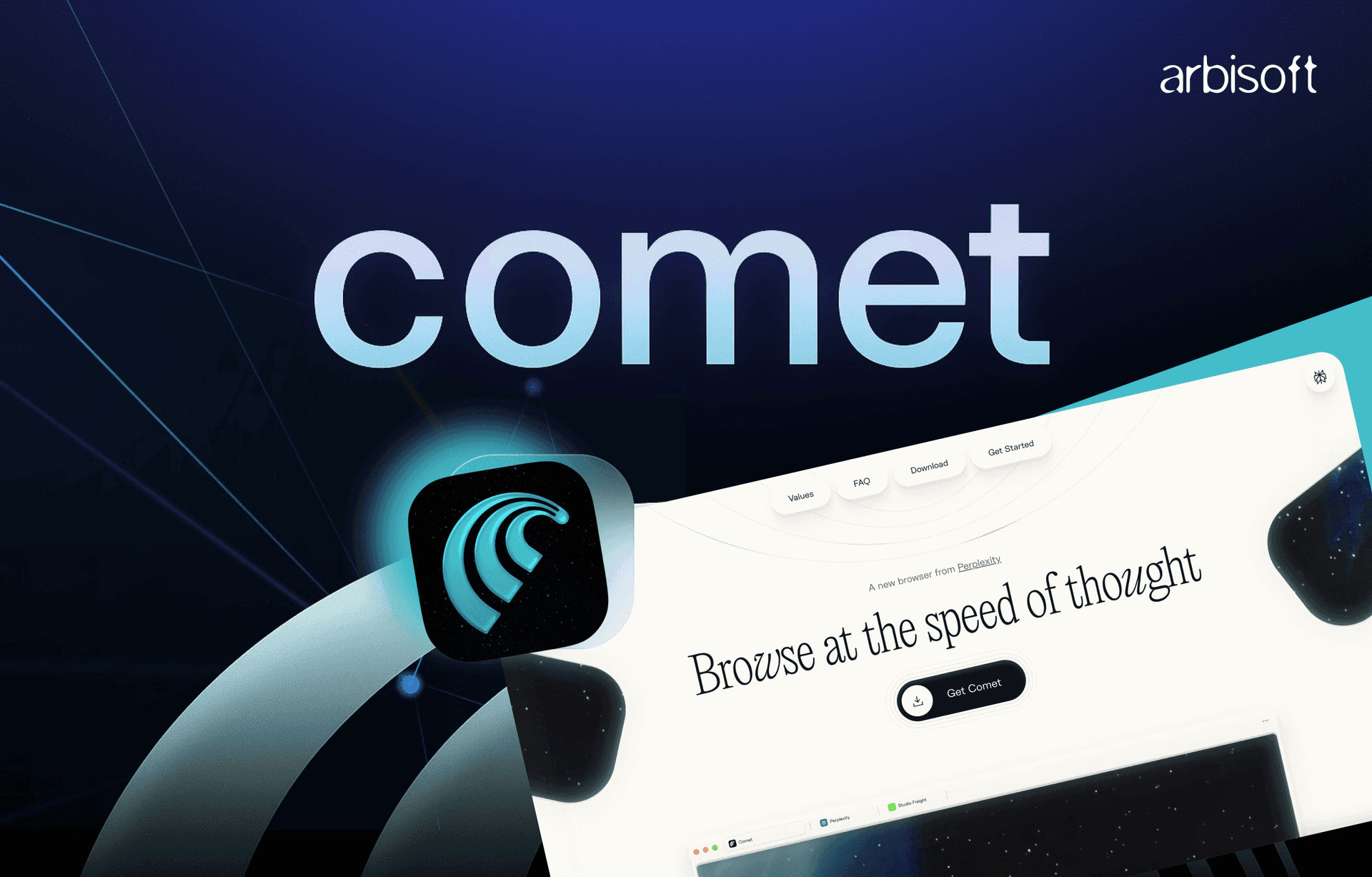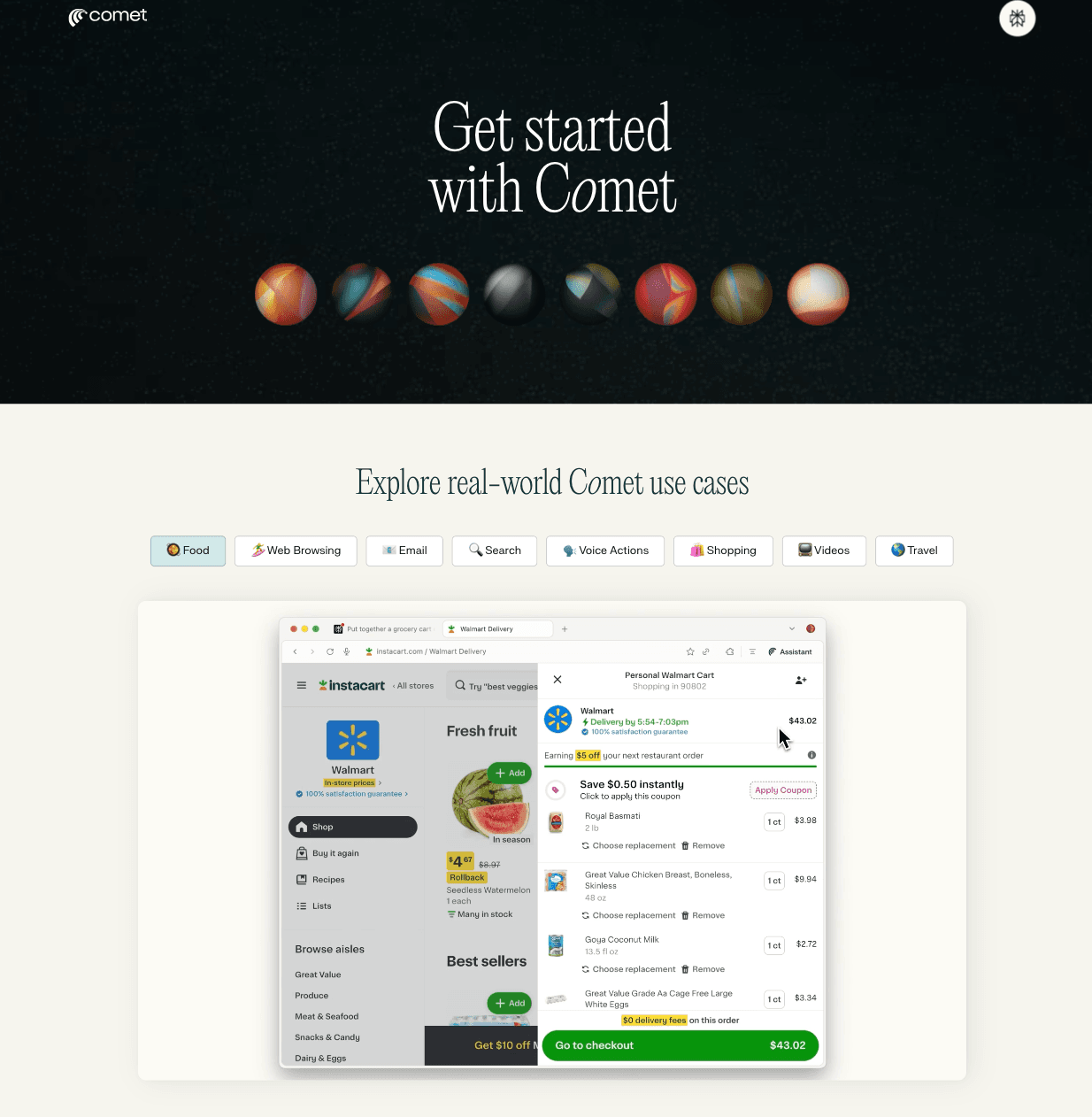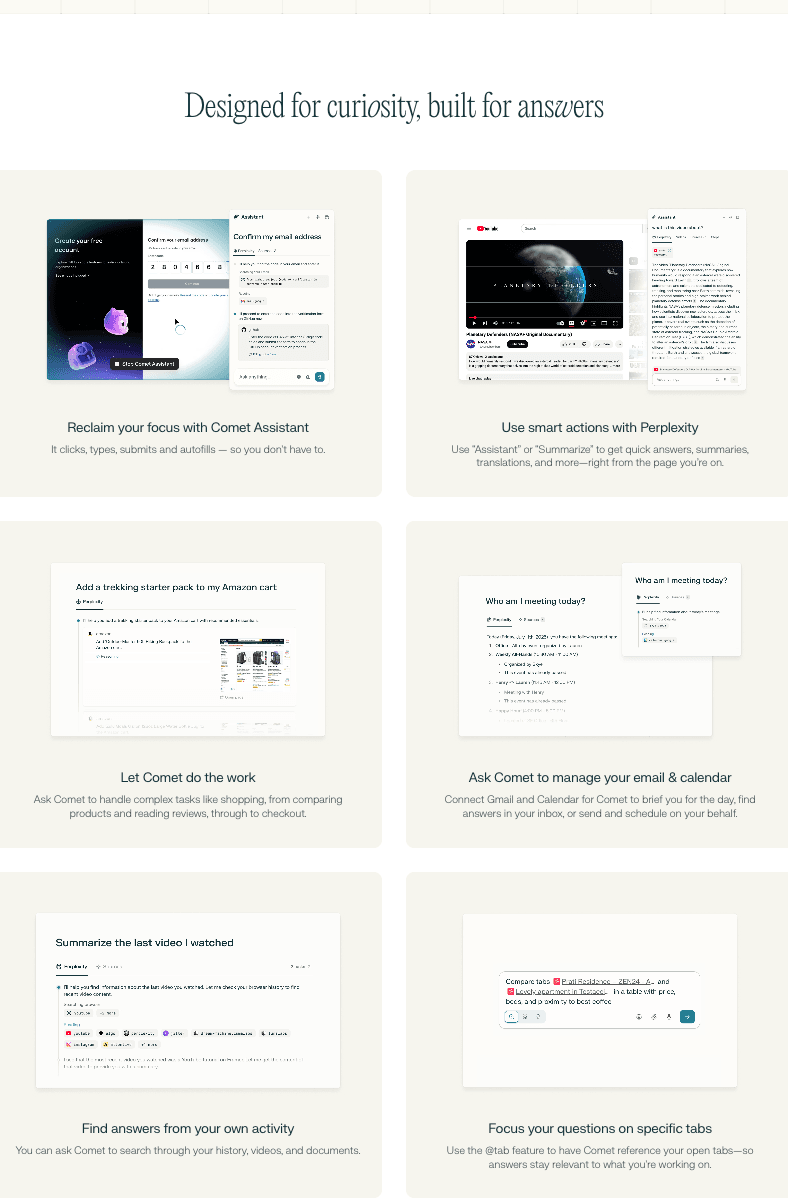We put excellence, value and quality above all - and it shows




A Technology Partnership That Goes Beyond Code

“Arbisoft has been my most trusted technology partner for now over 15 years. Arbisoft has very unique methods of recruiting and training, and the results demonstrate that. They have great teams, great positive attitudes and great communication.”
Comet by Perplexity: The AI-Powered Browser That Thinks for You

For the past year, many of us have moved beyond traditional search engines. Instead of typing keywords and sifting through pages, we ask AI LLMs like Perplexity, ChatGPT, Qwen 2.5Max for quick, clear answers. It feels faster and smarter but it’s still separate from the way we browse. We search in one place, then jump back into a browser to act on the results.
Comet is the next step. It doesn’t just give you answers; it transforms the browser itself into an intelligent partner. Instead of being a passive tool for clicking links, Comet tries to understands what you need, helps you plan, summarizes pages, and even completes tasks, all inside your browsing experience. It’s not about replacing the web. It’s about making it feel more human, and more useful, than ever before
A Quick Look at the Launch
Comet was officially announced on February 24, 2025, by Perplexity AI. After a few months of testing on Mac and Windows, it launched to Perplexity Max subscribers on July 9, 2025. The subscription currently costs $200/month, but a free version is coming later this summer. Mobile apps for Android and iOS are also in the works. Android is already ahead in development.
For now, early access is available through invites, and more people are being added each week.

What is Comet?
Comet is a web browser built on Chromium, just like Google Chrome. But what makes it special is that it puts AI at the center of everything you do online.
Instead of switching tabs and hunting down answers, you can ask questions in plain language, highlight text for summaries, and get help with tasks like research, planning, writing, or even booking a flight. You can talk to the Comet Assistant, a built-in AI on the side of your screen, and it will help you act, not just search.
Everything feels smoother and simpler, like you’re finally browsing with someone who gets you.

Why It Feels Different
Comet is built to work with you, not against you. Here's what makes it stand out:
1. It Can Think and Act
This isn’t just a search tool. Comet can carry out multi-step tasks. Ask it to find vacation options, compare plans, summarize articles, or even help draft an email. It remembers what you’re doing and can handle different tasks across websites. It’s smart and helpful in a way that feels almost human.
2. You Can Trust What It Shows
Every time Comet gives you an answer, it shows exactly where that answer came from. You'll see links to real sources, so you can check the facts for yourself. That kind of honesty makes a big difference.
3. It Keeps You in Flow
You can highlight any part of a page and get quick explanations or counterpoints, right there, without opening new tabs. This keeps your focus steady and your mind clear.
4. Your Privacy Stays Yours
Unlike many browsers, Comet stores your data locally. Nothing you do is used to train the AI. No personal information is sent to the cloud. You stay in control.
How It Works Under the Hood
Even though Comet feels simple, it’s powered by smart, modern technology:
- It uses natural language processing to understand your questions and commands.
- It reads the context of the page you're on and tailors its help to what you're doing.
- It uses something called “agentic AI”, which means it can chain together steps like a human assistant would.
- And most importantly, it stores your browsing data on your device, not in the cloud. That means it’s faster, safer, and more private.
This technology works quietly in the background so you experience browsing that feels simple and seamless.
Why It Matters for Everyday People
Most of us aren’t tech experts. We want fast answers, smart insights, and maximum efficiency; exactly what AI solutions for business provide. Comet helps with all of that.
- You no longer have to click through ten links just to understand one idea. You ask, and it tells you, clearly, quickly, and with sources.
- You don’t need five apps open to complete a task. Comet helps you do it all in one place.
- You don’t need to feel lost or unsure. The AI helps you along the way like a calm, reliable guide.
Whether you’re a student doing research, a parent planning a trip, or someone looking up medical information, Comet helps you feel more in control and less exhausted by the internet.
A Shift for SEO Professionals
For people working in SEO, Comet brings both challenges and opportunities.
What’s Changing
- Users might get answers straight from the AI and not always click through to the website.
- This means fewer clicks, but not necessarily less value.
- The AI gives credit to sources, so well-written, accurate pages are more likely to be seen.
What You Can Do
- Create trustworthy, clear, and detailed content.
- Use structured data and good headings so the AI can understand your pages.
- Focus on becoming a reliable source, because the AI prefers to show high-quality information with clear authorship.
Comet doesn’t kill SEO, it simply rewards better content.
What It Means for Performance Marketing
For performance marketers, the challenge is different. Comet shorten the buyer's journey. Users don’t hop across multiple sites, they ask, compare, and decide within seconds. This changes how ads, landing pages, and brand trust work.
Your performance marketing strategy now:
- Prioritize instant clarity: Landing pages must deliver value immediately, clear benefits, pricing, and strong CTAs.
- Leverage social proof: Reviews and ratings influence AI summaries, so highlight credibility everywhere.
- Think AI-driven comparison: Your product might be compared side-by-side with competitors in the AI response, so focus on transparent, differentiating facts.
In short, performance marketing becomes less about tricks and more about truth. That’s a good thing.
Some Concerns and Real-World Reactions
Not everyone was happy with Perplexity in the past. Big publishers like News Corp and Dow Jones accused the company of summarizing articles that were behind paywalls. In response, Perplexity started a publisher partnership program. The goal was to respect content rights and also give media companies a way to earn from their work.
Now, with Comet coming out, these concerns are not going away. In fact, they might even grow. If some people did not like Perplexity before, the feeling will probably carry over to Comet as well. After all, this browser is built around the same idea, AI giving answers and summaries.
It is not an easy problem. People want fast, easy access to knowledge. But creators want to protect the work they make. Comet will need to handle this very carefully if it wants to build trust and grow.
Another POV: Does It Feel Truly New?
There is also another concern. Big tech companies launch new AI tools almost every month. Because of this, people are not as curious as they used to be. Many feel that every new update sounds “big,” but ends up being just another feature.
Comet sounds exciting. But is it really doing something we have never seen before? Some say the biggest difference is the user experience. It feels simple, clean, and helpful. That might be its strongest point.
Still, there is a big challenge: getting people to switch. Most people do not change browsers easily. They stay with whatever feels safe and familiar. Comet will need more than cool features. It will need to give users a strong reason to leave their old habits.
What’s Coming Next
Comet’s journey is just getting started. Here's what we know is on the way:
- A free version of the browser later this summer
- Android and iOS mobile apps (Android is almost ready)
- New features like email writing, calendar sync, and even video or PDF summarizing
- Better tools for researchers, teachers, students, and professionals
The goal is simple: make the browser a smarter, more helpful place, no matter what device you’re using.
So, Is It a More Human Web
Comet feels like more than just another browser update. It reflects a bigger shift in how we interact with the internet a move from endless searching to meaningful finding, from managing tabs to managing ideas. For years, the web has asked us to adapt to its chaos. Now, with Comet, it feels like the web is adapting to us. It’s quieter, smarter, and built to work alongside us, not against us.
Will it solve every problem? Maybe no. Questions around trust, content rights, and adoption will remain. But if Comet succeeds, it could set a new standard for what browsing should feel like: faster, simpler, and yes more human. Because at the end of the day, the best technology doesn’t just give us answers. It gives us time, clarity, and space to think. And that might be the most powerful change of all.
People Also Asked
1. What is Comet by Perplexity?
Comet is an AI-powered web browser built on Chromium that integrates intelligent features like summarization, task automation, and natural language search. It’s designed to make browsing faster, simpler, and more interactive.
2. How is Comet different from traditional browsers?
Unlike regular browsers, Comet doesn’t just open web pages. It helps you find answers, summarize content, and even complete multi-step tasks without switching tabs. It works like an intelligent assistant inside your browser.
3. Does Comet store my personal data?
No. Comet prioritizes privacy by storing your data locally on your device. Nothing is sent to the cloud or used to train AI models, which makes it more private than many other browsers.
4. Is Comet free to use?
Right now, Comet is available to Perplexity Max subscribers for $200/month. A free version is planned for release later this summer, along with mobile apps for Android and iOS.
5. Who can benefit most from Comet?
Comet is useful for anyone who spends a lot of time online—students, researchers, professionals, and everyday users. It simplifies research, planning, and decision-making by reducing the need to jump between multiple tabs and apps.
























